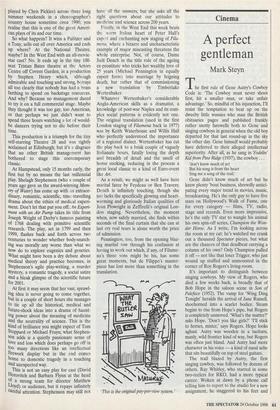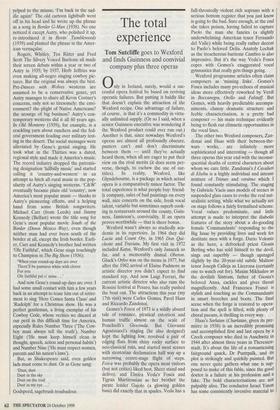Cinema
A perfect gentleman
Mark Steyn
The first rule of Gene Autry's Cowboy Code is: 'The Cowboy must never shoot first, hit a smaller man, or take unfair advantage.' So, mindful of his injunction, I'll resist the temptation to beat up on the dweeby little wussies who man the British obituaries pages and published frankly rather snotty farewells both to Gene and singing cowboys in general when the old boy departed for that last round-up in the sky the other day. Gene himself would probably have deferred to their alleged intellectual superiority. After all, as he sang in Yodelin' Kid from Pine Ridge (1937), the cowboy ...
'don't know much of art But his song is from the heart Sing me a song of the trail.'
Gene didn't know much of art but he knew plenty 'bout business, shrewdly antici- pating every major trend in movies, music, broadcasting. He's the only guy to have five stars on Hollywood's Walk of Fame, one for every category — films, TV, radio, stage and records. Even more impressive, he's the only TV star to wangle his animal his own spin-off series, Champion the Won- der Horse. As I write, I'm looking across the room at my cat: he's watched me crank out a thousand Spectator pieces, but what are the chances of that deadbeat carrying a column of his own? Only Champion pulled it off — not like that loser Trigger, who just wound up stuffed and unmounted in the corner of Roy Rogers's living-room.
It's important to distinguish between singing cowboys. My view of Rogers, who died a few weeks back, is broadly that of Bob Hope in the saloon scene in Son of Paleface (1952). The vamp for 'Wing Ding Tonight' heralds the arrival of Jane Russell, shoehorned into a scarlet bodice. Steam begins to rise from Hope's pipe, but Rogers is completely unmoved. 'What's the matter?' asks Hope. 'Don't you like girls?' I'll stick to horses, mister,' says Rogers. Hope looks aghast. Autry was wooden in a taciturn, manly, wild frontier kind of way, but Rogers was often just bland. And Autry had more character in his voice — a kind of nasal ache that sits beautifully on top of steel guitars.
The trail blazed by Autry, the first singing cowboy, was followed by dozens of others. Ray Whitley, who starred in some two-reelers for RKO, had a more typical career. Woken at dawn by a phone call telling him to report to the studio for a new assignment, he staggered to his feet and yelped to the missus, 'I'm back in the sad- dle again!' The old cartoon lightbulb went off in his head and he wrote up the phrase as a song in Border G-Man (1938). No one noticed it except Autry, who polished it up, re-introduced it in Ravin' Tumbleweeds (1939) and planted the phrase in the Amer- ican vernacular.
Rogers, Whitley, Tex Ritter and Fred Scott The Silvery Voiced Baritone all made their screen debuts within a year or two of Autry in 1935; by 1937, Herb Jeffries was even making all-negro singing cowboy pic- tures. But the original was always the best. Pre-Dances with Wolves westerns are assumed to be a conservative genre, yet Autry manages to share all Kevin Costner's concerns, only not so tiresomely: the envi- ronment? the plight of Native Americans? the scourge of big business? Autry's con- temporary westerns did it all 60 years ago. In Old Monterey (1939), for example, is a crackling yarn about ranchers and the fed- eral government feuding over military test- ing in the desert. The social messages were alleviated by Gene's genial singing. He took what in the Thirties was a dated, regional style and made it America's music. The record industry dropped the patronis- ing designation 'hillbilly music' and started calling it 'country-and-western' in an attempt to hitch all rural music to the pop- ularity of Autry's singing westerns. `C&W' eventually became plain old 'country', now America's most popular music — thanks to Autry's pioneering efforts, and a helping hand from some British songwriters. Michael Can (from Leeds) and Jimmy Kennedy (Belfast) wrote the title song for Gene's most popular movie South of the Border (Down Mexico Way), even though neither man had ever been south of the border at all, except the Irish border. Earli- er, Carr and Kennedy's brother had written 'Ole Faithful', which Gene sings touchingly to Champion in The Big Show (1936):
'When your round-up days are over There'll be pastures white with clover For you Ole faithful pal o' mine ...'
And now Gene's round-up days are over. I had some small contact with him a few years back in an attempt to tease him out of retire- ment to sing 'Here Comes Santa Claus' and 'Rudolph' for a Christmas show. He was a perfect gentleman, a living exemplar of his Cowboy Code, whose verities we discard at our peril in this difficult time for America, especially Rules Number Three (`The Cow- boy must always tell the truth), Number Eight ('He must keep himself clean in thought, speech, action and personal habits') and Number Nine ('He must respect women, parents and his nation's laws').
But, as Shakespeare said, even golden lads must come to dust. Or as Gene sang: 'Dust, dust
Dust in the sky Dust on the trail Dust in my eye ...'
Godspeed, sagebrush troubadour.



















































































 Previous page
Previous page